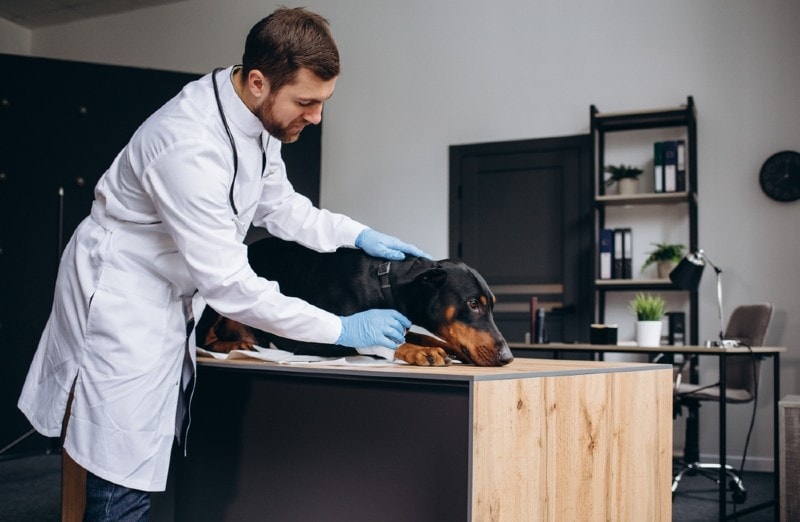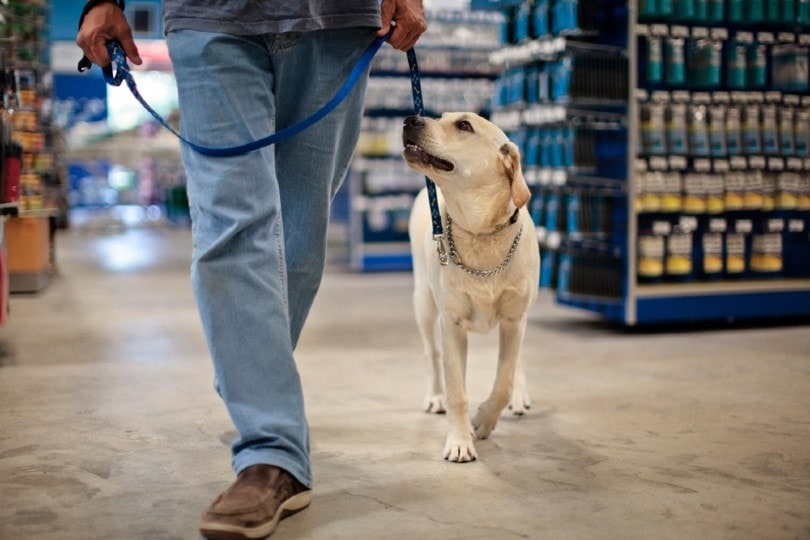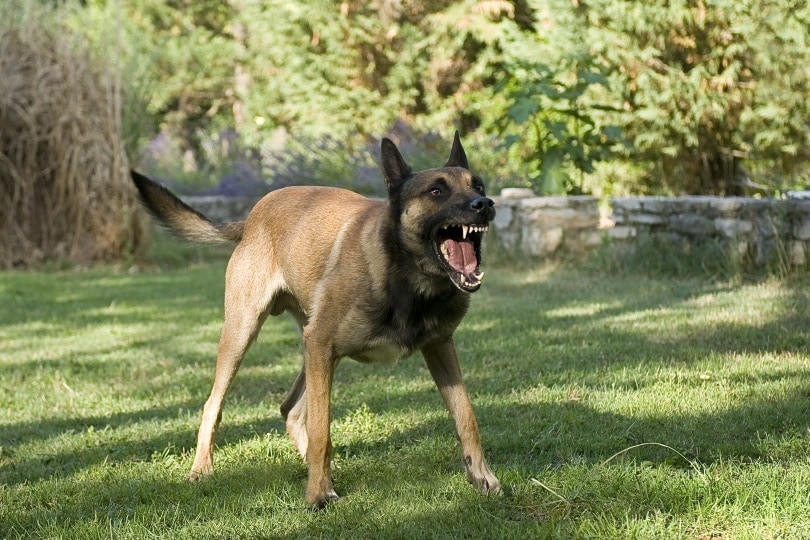7 Doberman Health Issues: Vet Approved Signs & What to Do
Updated on

Dobermans are one of the most impressive dog breeds around. These gorgeous creatures were originally bred to be guard dogs, but now they find themselves on the couch loving life by our sides. Unfortunately, the Doberman breed is also known for having a few hereditary ailments that can plague them throughout their lives. Here’s a look at seven Doberman health issues you need to know if you plan on keeping your best friend healthy throughout their lifetime with you.
The 7 Doberman Health Issues
1. Dilated Cardiomyopathy
Hearing the words “dilated cardiomyopathy” is scary for a Doberman owner. Any medical issue your pet suffers from can be distressing. Dilated cardiomyopathy is the medical term for a type of heart disease where the heart muscles become weak and the heart enlarges. It is progressive and will eventually lead to heart failure.
- Shortness of breath or coughing
- Fainting
- Lethargy
- Weakness
2. Von Willebrand Disease
Von Willebrand disease is one of the most common hereditary ailments in dogs. It is a bleeding and clotting disorder similar to hemophilia. Dobermans who suffer from Von Willebrand disease can have serious issues when it comes to injuries due to excessive bleeding.
- Nosebleeds, which are normally rare in dogs
- Bruising
- Excessive and prolonged bleeding after an injury or surgery
- Blood at the gums
- Blood in your dog’s urine or stool
3. Chronic Active Hepatitis

Chronic active hepatitis is thought to be hereditary in Dobermans and results in liver damage and eventually liver failure. When a Doberman has this liver disorder, the levels of copper in their bodies can build to toxic levels. CAH is most common in female dogs but can affect males as well. Normally, the disorder doesn’t present itself until the dog is 4 to 6 years old, and it can be quite advanced before signs are noticed. Many pet owners first notice this disorder due to a dog suffering from increased thirst and frequency of urination.
- Vomiting
- Weight loss
- Loss of appetite
- Lethargy
- Retention of abdominal fluid
4. Cervical Vertebral Instability
This neurological disorder in Dobermans, also called Wobbler Syndrome, is caused by compression or pressure on the area of the spinal cord that aligns with your dog’s neck. If your dog suffers from cervical vertebral instability the condition will worsen over time. Typically, this disorder presents itself in dogs older than 3 and can leave them unable to get up or walk on their own.
- Wobbling when walking
- Dragging or signs of weakness in the hind legs
- Steps are short and jerky
- The neck is held in a flexed or downward position
- Neck pain
5. Hypothyroidism
Hypothyroidism is a common ailment in medium to large-sized dog breeds. This hereditary condition is caused by a decreased production of the thyroid hormone. Thankfully, this issue is treatable and can be monitored and controlled with medication from your Doberman’s veterinarian.
- Lethargy
- Dry skin
- Sensitivity to cold
- Weight gain
- Depression
6. Gastric Dilatation and Volvulus Syndrome

Gastric dilatation and volvulus syndrome, also known as bloat, is a common ailment affecting primarily deep-chested dogs. Dobermans fit this description. Considered an emergency situation, bloat is when the stomach rotates on its axis. This closes off the esophagus and stomach exit to the intestines. This obstruction causes gas to build up inside the stomach and restricts blood flow to the digestive tract. This condition is fatal if veterinary attention is not received urgently. If your dog shows signs, get them to a vet as quickly as possible.
- Gagging without throwing up
- Excessive slobbering or drooling
- A distended or bloated belly
7. Hip Dysplasia
Hip dysplasia is a common hereditary issue in larger dog breeds. It occurs when the development of the hip joint is affected causing the ball and socket to fit improperly. When this happens, it can cause pain and weakness in the hind legs. Unfortunately, this issue can present itself at any point in a dog’s life and can become quite painful due to secondary joint changes.
- Difficulty getting up
- Limping
- Avoiding activities like running and jumping
- Lowered activity levels
Final Thoughts
As you can see, several medical issues plague the Doberman breed. If you have a Doberman as your best friend, it is important to watch for signs of issues. You should also take your Doberman to the veterinarian routinely so they can help you monitor your dog for hereditary issues and other illnesses. The best way to keep your Doberman happy and healthy is to work closely with their medical provider and give them all the love they need.
Featured Image Credit: Roman Fenton, Shutterstock












